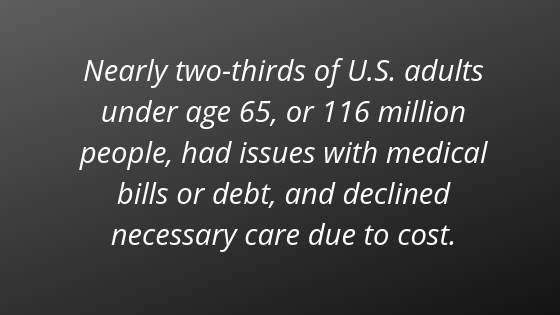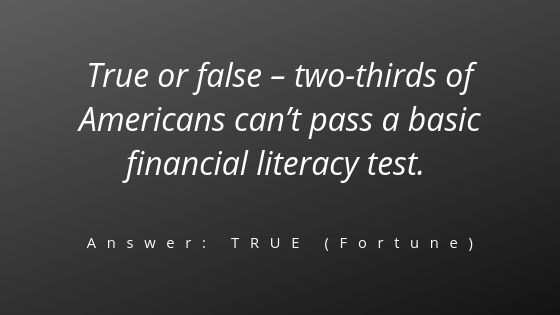With America’s credit debt now soaring past a $1 trillion as of January 2019, it’s clear we as a nation need to reconsider our financial health, the ways it can affect our everyday lives, and the positive steps we can take to get back on the track to financial wellness.
“Financial health is a privilege that should be afforded to everyone – and it starts with being willing to have the conversation while also acknowledging our own background and bias.”
Erin Lowry, broke millennial
How tough would the honest conversation proposed above make you feel, in your gut, right now? A little unsettling? Possibly downright frightening? You wouldn’t be alone. Financial health is not a foregone conclusion, even in this near decade-long “bull market.” Nearly half of all Americans can’t afford a $400 emergency (CNN Money), and over half claim they’re financially “coping.” Ouch. Coping? America’s financial health as a system is failing and it has been for a long time.
Financial wellness is defined by the Consumer Financial Protection Bureau (CFPB) as:
- a state of being wherein one has control over day-to-day and month-to-month finances,
- has the capacity to absorb a financial shock,
- remains on track to meet established financial goals,
- and possesses the financial freedom to make the choices that allow one to enjoy life.

In turn, when we lack financial wellness, it affects us mentally and physically. According to Commonwealth Fund: Nearly two-thirds of U.S. adults under age 65, or 116 million people, had issues with medical bills or debt, and declined necessary care due to cost.
Such numbers are alarming. Let’s explore how financial wellness can help improve overall health.
Reduced Stress
It’s not hard to believe finances are the leading cause of stress among both men and women (Everyday Health). In fact, a 2017 Stress In America survey by the American Psychological Association (APA) found that 62% of Americans reported money was a significant source of stress in their lives. But understanding how to manage and overcome that stress can reap real dividends for one’s health. Adapting a financial wellness routine not only reduces stress but also boosts innovation and creativity in one’s personal and professional lives. Starting small and making wiser decisions on a daily basis can inspire the confidence to take control of your finances. Pulling together and examining your bank statements, credit report, your retirement plan statement, and being honest with yourself about where you are and how you treat your finances can put you on the right track to less stress. There are a number of online apps designed to support this type of activity.
Improved Work Performance

According to Benefit News, 45% of employees distracted by their finances tend to spend at least 3 working hours dealing with money problems every week. Discovering and managing your financial wellness to success has a direct effect on your professional performance and productivity. One could also suggest this reduces your employment growth potential, which reduces your earning power and lessens your retirement savings.
Financial Wellness Education (or lack thereof)
According to Forbes, only five states have any kind of personal finance requirement in high school. In fact, high school grade levels were the only ones mentioned in the piece. By and large, the citizens of this great country don’t realize how important it is to learn about financial education until it’s too late or when they have to start thinking about retirement.
Consider these stats:
- 43% of student loan borrowers aren’t making their payments
- 38% of U.S. households have credit card debt
- 33% of American adults have $0 saved for retirement

True or false – two-thirds of Americans can’t pass a basic financial literacy test.
Answer: TRUE (Fortune)
With modern-day America’s glaring lack of financial literacy, it’s next to impossible to deny it affects our financial wellness.
Goal-Setting to Achieve Your Financial Benchmarks
Setting benchmarks to achieve your financial goals is a core step to improving your overall health in a positive manner. This means planning ahead and making a conscious effort to write down your goals. An article in Everyday Health states the very act of “planning ahead” enhances your engagement with your finances. Simply pay attention to where your money is going, how much, and identifying issues with how you use it can help you feel more in control of not only the money but your life in general.
It’s not how much money you have. It’s learning healthy habits to manage it that makes all the difference.






